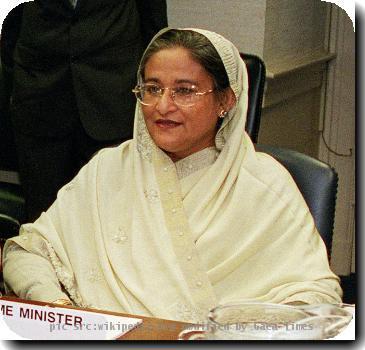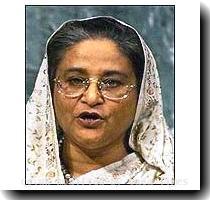Bangladesh’s Buddhist tribals seek Hasina’s intervention (Lead, changing dateline)
By IANSMonday, February 22, 2010
DHAKA - Bangladeshs Buddhist tribals Monday sought direct intervention of Prime Minister Sheikh Hasina alleging that killing of five people and the burning of their homes and four prayer houses by Muslim settlers in Chittagong Hill Tracts (CHT) was backed by the army.
The charges were levelled at a rally in Rangamati, headquarters of the southeastern district that is home to the indigenous people, and a memoramdum to the prime minister was submitted through Rangamatis deputy commissioner.
Demanding action against the commander of the army force stationed in the district, the tribals demanded that police replace army personnel.
Six human rights and civil society organisations also demanded “proper legal action through neutral investigation” against those responsible for last weeks violence, Star Online, web site of The Daily Star said.
The organisations are Ain O Salish Kendra (ASK), Bangladesh Legal Aid Services Trust (BLAST), Association for Land Reform and Development (ALRD), Nijera Kori, Brac’s Legal Aid Programme, and Transparency International, Bangladesh (TIB).
The Bangladesh government has said it will reconstruct the four prayer houses set ablaze during two days of violence against Buddhist tribals in Chittagong Hill Tracts (CHT).
Dipankar Talukdar, the minister in charge of the region, said this would be done “as soon as possible”.
He also promised action against those responsible within seven days.
At least four prayer houses were burnt down, allegedly by Muslim settlers, in Gangaram Mukh area and nearby villages under Baghaichhari upazila (sub-district) in Rangamati during Saturday’s arson attack, the website of The Daily Star said.
A mosque and a church at Gangaram Mukh, a Buddhist temple at Maitreepur and another in ‘guccha gram’ (cluster of villages) under Baghaichhari upazila in the district were set on fire.
CHT has witnessed recurring violence between the locals and the Muslim Bengali- speaking people settled as part of the policy of successive governments to control the turbulent area.
Although a Buddhist-majority district, CHT was allocated to Pakistan when the British divided India in 1947.
Hasina had reached an accord with the tribals during her earlier tenure. Most provisions of the accord, however, remain to be enforced.
Withdrawing army camps is one such provision and its implementation has divided political opinion.
Main opposition Bangladesh Nationalist Party (BNP) that had frozen the accord when it was in power is siding with the Muslim settlers.
Mirza Fakhrul Islam Alamgir, senior joint secretary general of BNP, said: “Army presence is essential for peaceful coexistence and security of all in Chittagong Hill Tracts.”
“The decision of army pullout was a blunder. We had expressed our concern at that time saying army withdrawal might invite catastrophic consequences,” he said and demanded re-evaluation of the CHT Peace Treaty.
However, the government and its allies and human rights groups want to continue with the accord.
Workers Party President Rashed Khan Menon, also a lawmaker, claimed the arson incident at Baghaichhari was part of a conspiracy to foil the CHT treaty and to create unrest.

